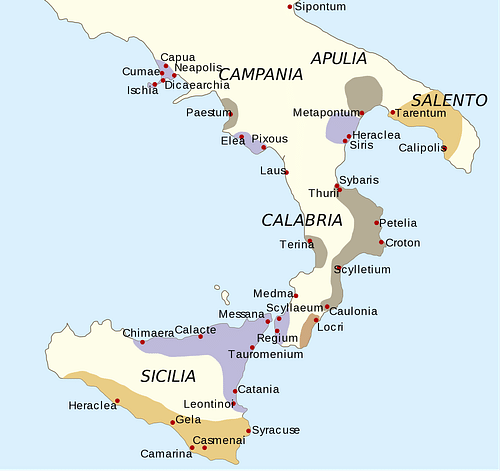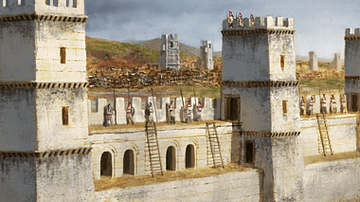
Magna Graecia (Megalē Hellas) refers to the coastal areas of southern Italy which were colonized by various ancient Greek city-states from the 8th to 5th centuries BCE. Sicily, although also a region of Greek colonization, is not usually included in this area. However, later writers such as Strabo did include Sicily as the term came to signify the entire Greek world.
The original Magna Graecia region extends from the Euboean colony of Cumae (probably the earliest and founded c. 740 BCE) to the Spartan colony of Tarentum (founded c. 706 BCE). The last of the Greek colonies to be founded was Heraclea in 433 BCE.
Greek Colonization
Greek colonists, following in the footsteps of the Bronze Age Mycenaeans, selected Magna Graecia as a suitable site for colonies due to the fertility of the land and, at the meeting point of the Greek, Etruscan, and Phoenician worlds, its advantageous geographical position for trade. That the colonies in southern Italy became a fully integrated part of the Greek world is evidenced in the presence of votive offerings from Magna Graecia at the great religious sanctuaries of Delphi and Olympia. Indeed, the ceasefire (ekecheiria) which was enforced during the Olympic Games was also respected in the colonies, and the list of victors at Olympia includes many a name from Magna Graecia. However, the region was not a single harmonious entity, for just as on mainland Greece, small city-states or poleis (quite independent from their founding mother-city) both competed and cooperated with neighbouring cities to form a constantly shifting political network of rivalries and alliances. The region was also subject to greater political instability precisely because it was at the crossroads of several civilizations, and its wealth in natural resources meant that territory was often enviously regarded, particularly by the tyrants of Sicily. These Greek cities were also unstable internally due to their cosmopolitan mix of races - locals, colonists, mercenaries, residents from neighbouring areas etc.
Key City-States
Amongst the most important poleis of Magna Graecia (with founding city and date) were:
- Cumae (Euboea, c. 740 BCE) the earliest Greek colony on the Italian mainland and founder of new cities such as Neapolis, which from 421 BCE became the most important city in Campania.
- Sybaris (Achaean/Troezen, c. 720 BCE) which had a reputation for luxury based on its rich agriculture and was itself the founder of Poseidonia (Paestum).
- Croton (Achaean, c. 710 BCE) where Pythagoras founded a religious community in 530 BCE.
- Tarentum (Sparta, 706 BCE) blessed with the best harbour on the coast of south Italy, the presence of Tarentine coins and goods across southern Italy are testimony to the city's prosperity and trade network.
- Elea (Phocaea, c. 540 BCE) famous for its Eleatic school of philosophy.
- Thurii (Athens, c. 443 BCE) the place of the historian Herodotus' retirement.
- Heraclea (Tarentum, 433 BCE) seat of the Italiote League from 387 BCE.
The late 5th century BCE saw increasing conflict with the indigenous population, particularly the Oscan tribes based in the Apennine Mountains. These peoples increasingly pushed into the fertile plains and so came eventually to overrun the poleis through mass immigration. However, in a reverse effect, the political and cultural model of the poleis also loosened the original cultural and political bonds of these indigenous populations so that they became in a certain sense 'Greek' - the polis system, Greek architecture, art, religion, and even language were all readily adopted. In the following centuries the area came in increasing contact with Rome, and by 89 BCE all of the surviving cities of Magna Graecia came fully under Roman control.





